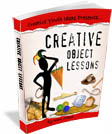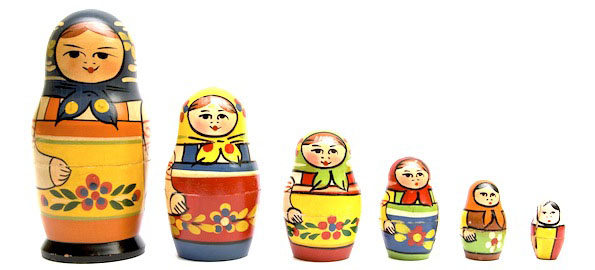We often use the term “spoon fed” to refer to babies. It is also used for people who have been given so much by others that they never learn how to think for themselves or take care of themselves. Scripture uses a similar term to describe some Christians. Like a spoon fed baby, some Christians have never grown up in their faith.
PLEASE SHARE THIS IDEA ON FACEBOOK – CLICK HERE
Games using Spoons
- Cotton Ball Spooner – Each youth is blindfolded, given a metal spoon, and placed in front of a large bowl of cotton balls. They must also hold a bowl or cup on top of their head. In the time given they youth compete by using the spoon to scoop the cotton balls into the cups on their heads while everyone else watches. Many times, they will deliver empty spoons to their heads and many times they will miss the cup. When time is up, the youth with the most cotton balls in the cup wins.
- Fastest Spoon – Get two volunteer victims from each team. Both youths will need to put on a big garbage bag with arm / head holes so they don’t get messy! The first youth sits on a chair. The second person is given a bowl of chocolate pudding with a spoon and stands behind them whilst blindfolded. The idea is that the person who is blindfolded has to feed the other person by following their verbal instructions. Alternatively you could get other members of the team to hold to bowl or give instructions. First team to finish wins.
- Hang it on your beak – The first youth to hang a spoon on his or her nose for mmore than 30 seconds wins. Variation: how many spoons can they hang from their face? Variation: See who can get the spoon off the nose and into his or her mouth using only his or her tongue. BTW, there is a world record for the most spoons hanging on a person’s face. It is 31 and was achieved by Dalibor Jablanovic (Serbia), in Stubica, Serbia, on 28 September 2013. Can you break it?
- Musical Spoons – While the music is playing, a spoon is passed from person to person. When the music stops, the person holding the spoon must eat something gross like babyfood and is eliminated from the game play.
- Potato Fencing – Players hold a spoon with a potato on it in one hand. In the other hand the players hold an empty spoon. Then they try to knock the opponents potato off the spoon without losing their own potato.
- Pudding Slurp – A new pair of stockings per contestant, a small bowl of pudding, some newspaper to play on and some damp towels for cleaning up. Contestants pull the stocking over their face and must race to eat all their pudding through the stocking.
- Spoon clumps – Clang two metal spoons together. If they clang 5 times then the youth must clump together in groups of 5 persons. If anyone is not in a group of five they are eliminated from play. Continue with different numbers of clangs until there is one small group of winners.
- Spoon Delivery – Choose a collection of objects of increasing size to be passed from the front of the line to the back of the line for each team. To avoid chipping teeth it might be best to use plastic or wooden spoons. First team to pass all the objects to the end of the line wins. Here are some ideas for objects: Cotton Balls, Ping Pong Balls, an egg (raw or hard boiled), marbles, lemon, apple, inflated balloon, ice cube.
- Spoon Feeding – Divide into pairs. For each pair, tape a spoon to the end of a broomstick and place a bowl of food on the table. One person stands on one side of the table and attempts to feed his or her partner the food using the spoon. The pair that eats the most food in a minute wins. Chocolate pudding works great for this.
- Spoon frog – Teams must launch teaspoons into plastic cups, using another spoon as a catapult. When the timer starts, the person must place a spoon in front of the cup with the spoon end facing him/her. Place the second spoon, facing the same way, so that the rounded end of the spoon is resting on the end of the first spoon. Then give the rounded end of the first spoon a good whack to send the second spoom flying. Keep sending spoons into the air and try to get one to land in a the cups. First to get one in, or the person who gets the most in the cup in one minute wins.
- Spoon fulls – Using spoons in the mouth for each team member, each individual team member will scoop up dried beans or popcorn kernels from a bowl and then drop them into a 1 liter soda bottle. At the end of one minute, the team with the highest filled bottle wins.
- Spoon Launch – One team member uses a spoon to launch food to the other. The youth that catches the most launched peanuts, M&Ms, or kernels of popcorn in their mouth wins.
- Spoon Tunes – Place ten tall drinking glasses that are filled with different amounts of water in order so that, when you tap them in a row with a spoon, they play a simple but familiar tune like Mary Had a Little Lamb. There should be one set for each team. Set them up and then scramble them so they have to figure out the order. Get the song right in under a minute to win the game.
- Spoons – Depending on the number of players, you need at least one deck of cards, and one spoon less than the number of players. Players sit in a circle with the spoons in the middle of the circle with their ends touching. To begin, each player is dealt 4 cards. The first player picks up a card from the top of the pile, and can choose to keep it, or pass it to the person on his or her left. Players can only hold a maximum of four cards. When someone gets four of a kind, he grabs a spoon. Once one person grabs a spoon, everyone else also grabs one until all the spoons are gone and 1 person is left without a spoon. Play resumes with one less player and one less spoon. Play continues until there is only one player left, the winner.
- Thread the Spoon – Cut some yarn into long segments, allowing about 4 feet of yarn per team member. If in doubt, always make your yarn longer than necessary. Tie one end of one piece of yarn to the end of one metal spoon to create a needle and thread for each team. Put the spoons (with the yarn attached) in the FREEZER to chill for at least an hour. If you want to make it even more fun, feed the string through an ice-cube tray so that when the ice is removed it forms cubes spaced along the string. In teams, the first youth must put the spoon down their shirt, through pants legs (or skirts) and out by their feet and repeat it down the line until everyone on the team is connected. First to finish wins.
- Wooden Spoons – Blindfolded, a youth must guess someone’s identity by feeling them with wooden spoons. Each person in the youth group in turn is guessed. Of course, any outburst of laughter when the spoons are going over a face would disclose the identity, so participants must keep perfect silence. When anyone’s identity is guessed, he/she has to be blindfolded and must take the spoons. Be careful when using the spoons to touch another person with them quite lightly, so as not to hurt anyone.
TAKE IT TO THE NEXT LEVEL
MAKE IT SPIRITUAL
Some of these games required us to feed others with a spoon. We often use the term spoon fed to refer to babies. It is also used for people who have been given so much by others that they never learn how to think for themselves or take care of themselves. Scripture uses a similar term to describe some Christians. Like a spoon fed baby, they have never grown up in their faith. What is normal for a baby is NOT normal behaviour for an adult.
- What are some things that babies do, that adults normally do not do?
- What are some immature, childlike habits and actions that might be ok for children, but are not acceptable for adults?
MAKE IT PRACTICAL
Read Hebrews 5:12-14 and 1 Corinthians 3:1-3.
- What were some of the characteristics of the Christians referred to in the scriptures?
- What are some of the signs of Christian immaturity?
- What is it that spiritual babies need to know and do in order to mature?
- What are some characteristics of spiritual maturity? What attitudes and actions would you expect to find in a mature Christian?
MAKE IT PERSONAL
- How would you describe your current level of spiritual maturity? Why?
- In what ways have you grown as a Christian?
- What do you need to do to continue to grow and mature as a Christian?
ADDITIONAL SCRIPTURE VERSES
- 1 Peter 2:2-3 “Like newborn babies, crave pure spiritual milk, so that by it you may grow up in your salvation, now that you have tasted that the Lord is good.”
- 2 Peter 3:18 “But grow in the grace and knowledge of our Lord and Savior Jesus Christ. To him be glory both now and forever! Amen.”
- Ephesians 4:11-15 “So Christ himself gave the apostles, the prophets, the evangelists, the pastors and teachers, to equip his people for works of service, so that the body of Christ may be built up until we all reach unity in the faith and in the knowledge of the Son of God and become mature, attaining to the whole measure of the fullness of Christ. Then we will no longer be infants, tossed back and forth by the waves, and blown here and there by every wind of teaching and by the cunning and craftiness of people in their deceitful scheming. Instead, speaking the truth in love, we will grow to become in every respect the mature body of him who is the head, that is, Christ.”
- 2 Thessalonians 1:3 “We ought always to thank God for you, brothers and sisters,[a] and rightly so, because your faith is growing more and more, and the love all of you have for one another is increasing.”
- Philippians 3:12-14 “Not that I have already obtained all this, or have already arrived at my goal, but I press on to take hold of that for which Christ Jesus took hold of me. Brothers and sisters, I do not consider myself yet to have taken hold of it. But one thing I do: Forgetting what is behind and straining toward what is ahead, I press on toward the goal to win the prize for which God has called me heavenward in Christ Jesus.”
PLEASE SHARE THIS IDEA ON FACEBOOK – CLICK HERE
 MORE IDEAS? See “Creative Object Lessons”
MORE IDEAS? See “Creative Object Lessons”
200 page e-book that explains everything you need to know when planning your very own object lessons. It contains 90 fully developed object lesson ideas and another 200 object lesson starter ideas based on Biblical idioms and Names / Descriptions of God.
![]()



 Description
Description